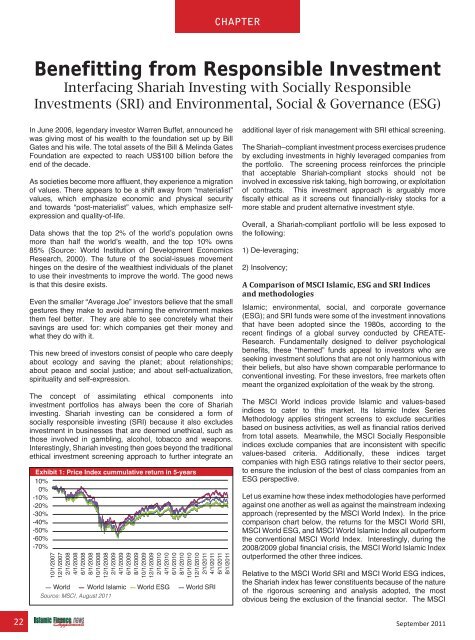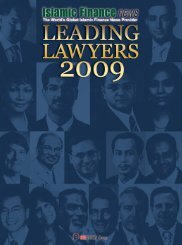Islamic Investor: Islamic Investor: - Islamic Finance News
Islamic Investor: Islamic Investor: - Islamic Finance News
Islamic Investor: Islamic Investor: - Islamic Finance News
You also want an ePaper? Increase the reach of your titles
YUMPU automatically turns print PDFs into web optimized ePapers that Google loves.
CHAPTER<br />
Benefitting from Responsible Investment<br />
Interfacing Shariah Investing with Socially Responsible<br />
Investments (SRI) and Environmental, Social & Governance (ESG)<br />
In June 2006, legendary investor Warren Buffet, announced he<br />
was giving most of his wealth to the foundation set up by Bill<br />
Gates and his wife. The total assets of the Bill & Melinda Gates<br />
Foundation are expected to reach US$100 billion before the<br />
end of the decade.<br />
As societies become more affl uent, they experience a migration<br />
of values. There appears to be a shift away from “materialist”<br />
values, which emphasize economic and physical security<br />
and towards “post-materialist” values, which emphasize selfexpression<br />
and quality-of-life.<br />
Data shows that the top 2% of the world’s population owns<br />
more than half the world’s wealth, and the top 10% owns<br />
85% (Source: World Institution of Development Economics<br />
Research, 2000). The future of the social-issues movement<br />
hinges on the desire of the wealthiest individuals of the planet<br />
to use their investments to improve the world. The good news<br />
is that this desire exists.<br />
Even the smaller “Average Joe” investors believe that the small<br />
gestures they make to avoid harming the environment makes<br />
them feel better. They are able to see concretely what their<br />
savings are used for: which companies get their money and<br />
what they do with it.<br />
This new breed of investors consist of people who care deeply<br />
about ecology and saving the planet; about relationships;<br />
about peace and social justice; and about self-actualization,<br />
spirituality and self-expression.<br />
The concept of assimilating ethical components into<br />
investment portfolios has always been the core of Shariah<br />
investing. Shariah investing can be considered a form of<br />
socially responsible investing (SRI) because it also excludes<br />
investment in businesses that are deemed unethical, such as<br />
those involved in gambling, alcohol, tobacco and weapons.<br />
Interestingly, Shariah investing then goes beyond the traditional<br />
ethical investment screening approach to further integrate an<br />
<br />
<br />
<br />
<br />
<br />
<br />
<br />
<br />
<br />
<br />
<br />
<br />
<br />
<br />
<br />
<br />
<br />
<br />
<br />
<br />
<br />
<br />
<br />
<br />
<br />
<br />
<br />
<br />
<br />
<br />
<br />
<br />
<br />
<br />
<br />
Source: MSCI, August 2011<br />
additional layer of risk management with SRI ethical screening.<br />
The Shariah–compliant investment process exercises prudence<br />
by excluding investments in highly leveraged companies from<br />
the portfolio. The screening process reinforces the principle<br />
that acceptable Shariah-compliant stocks should not be<br />
involved in excessive risk taking, high borrowing, or exploitation<br />
of contracts. This investment approach is arguably more<br />
fi scally ethical as it screens out fi nancially-risky stocks for a<br />
more stable and prudent alternative investment style.<br />
Overall, a Shariah-compliant portfolio will be less exposed to<br />
the following:<br />
1) De-leveraging;<br />
2) Insolvency;<br />
A Comparison of MSCI <strong>Islamic</strong>, ESG and SRI Indices<br />
and methodologies<br />
<strong>Islamic</strong>; environmental, social, and corporate governance<br />
(ESG); and SRI funds were some of the investment innovations<br />
that have been adopted since the 1980s, according to the<br />
recent fi ndings of a global survey conducted by CREATE-<br />
Research. Fundamentally designed to deliver psychological<br />
benefi ts, these “themed” funds appeal to investors who are<br />
seeking investment solutions that are not only harmonious with<br />
their beliefs, but also have shown comparable performance to<br />
conventional investing. For these investors, free markets often<br />
meant the organized exploitation of the weak by the strong.<br />
The MSCI World indices provide <strong>Islamic</strong> and values-based<br />
indices to cater to this market. Its <strong>Islamic</strong> Index Series<br />
Methodology applies stringent screens to exclude securities<br />
based on business activities, as well as fi nancial ratios derived<br />
from total assets. Meanwhile, the MSCI Socially Responsible<br />
indices exclude companies that are inconsistent with specifi c<br />
values-based criteria. Additionally, these indices target<br />
companies with high ESG ratings relative to their sector peers,<br />
to ensure the inclusion of the best of class companies from an<br />
ESG perspective.<br />
Let us examine how these index methodologies have performed<br />
against one another as well as against the mainstream indexing<br />
approach (represented by the MSCI World Index). In the price<br />
comparison chart below, the returns for the MSCI World SRI,<br />
MSCI World ESG, and MSCI World <strong>Islamic</strong> Index all outperform<br />
the conventional MSCI World Index. Interestingly, during the<br />
2008/2009 global fi nancial crisis, the MSCI World <strong>Islamic</strong> Index<br />
outperformed the other three indices.<br />
Relative to the MSCI World SRI and MSCI World ESG indices,<br />
the Shariah index has fewer constituents because of the nature<br />
of the rigorous screening and analysis adopted, the most<br />
obvious being the exclusion of the fi nancial sector. The MSCI<br />
22 September 2011

















